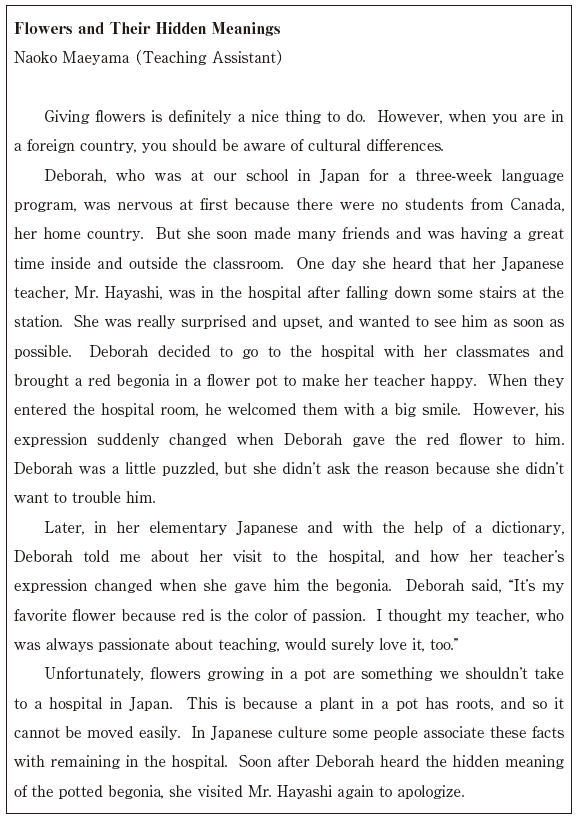You found the following story in a study-abroad magazine.

問1 According to the story, Deborah’s feelings changed in the following order: ( ).
1. nervous → confused → happy → shocked → sorry
2. nervous → confused → sorry → shocked → happy
3. nervous → happy → shocked → confused → sorry
4. nervous → happy → sorry → shocked → confused
5. nervous → shocked → happy → sorry → confused
6. nervous → sorry → confused → happy → shocked
問2 The gift Deborah chose was not appropriate in Japan because it may imply ( ).
1. a long stay
2. congratulations
3. growing anger
4. passion for living
問3 From this story, you learned that Deborah ( ).
1. chose a begonia for her teacher because she learned the meanings of several flowers in her class
2. not only practiced her Japanese but also learned about Japanese culture because of a begonia
3. visited the hospital with her teaching assistant to see her teacher and enjoyed chatting
4. was given an explanation about the begonia by Mr. Hayashi and learned its hidden meaning
【解説】問1 正解率 74.8%
問題問1 According to the story, Deborah’s feelings changed in the following order: ( ).
Deborah’s feelings がどの様に変わっていったかという問題です。本文を読みながら感情に関する語句があれば、しるしをしておくと後で見返しやすいですね。
まず本文四行目に nervous が出てきました。しかし、これは選択肢の全てに当てはまります。
そして次の感情は、まず次の行に But があります。but は逆接の接続詞ですから、nervous の逆の感情になると考えられます。そして having a great time とありますので、happy と想像できます。
それ以降の、感情をあらわす語句を抜き出してみますと、こうなります。
「surprised and upset」→「puzzled」→「apologize」
これは選択肢の語句に合わせると、こうなります。
shocked → confused → sorry
3. nervous → happy → shocked → confused → sorry
よって正解は、「3」です。
【解説】問2 正解率 62.1%
「Deborah が選んだ贈り物は日本では不適切でした。なぜならそれは ( ) かもしれません」
本文にこうあります。
This is because a plant in a pot has roots, and so it cannot be moved easily.
「これは鉢に入った植物は根があり、それで簡単に動かせないからです」
ということで、1. a long stay ですから、正解は「1」です。
ちなみに、お見舞いに持って行ってはいけない花ってありますよね。
シクラメンは「死苦ラメン」なのでダメ。菊はお葬式で使う花なのでダメ。ツバキ、チューリップはポトリと花が落ちるので、不吉なんですって。ユリはうつむいている。バラは真っ赤な血を連想させるからダメ。
そういえば Deborah が持って行ったベゴニアも「赤」でした。ということは二重の意味でダメだったんですね。そりゃ笑っていた林先生の表情も、変わってしまいます。
【解説】問3 正解率 56.2%
「この物語から、あなたは Deborah が ( ) とわかりました」
1. chose a begonia for her teacher because she learned the meanings of several flowers in her class
「彼女が授業でいくつかの花の意味を学んだので、先生へベゴニアを選んだ」
授業でそんなことを教えているという話はありませんでしたし、もし仮にあったらそれはそれで問題ですよね。嘘を教えていることになりますから。この選択肢はダメです。
3. visited the hospital with her teaching assistant to see her teacher and enjoyed chatting
「先生に会いに補助教員と一緒に病院を訪れ、そしておしゃべりを楽しんだ」
本文にはこうあります。
「Deborah はクラスメイトと一緒に病院に行くことを決めた」
秒委任一緒に行ったのは「クラスメイト」ですから、この選択肢はダメです。
4. was given an explanation about the begonia by Mr. Hayashi and learned its hidden meaning
「林先生からベゴニアについて説明を受けて、その隠された意味を学んだ」
ベゴニアの花の意味が分かるくだりは第三、第四段落にあります。ベゴニアの説明をしたのは Teaching Assistant ですね。林先生ではありません。だからこの選択肢はダメです。
2. not only practiced her Japanese but also learned about Japanese culture because of a begonia
「日本語を練習するだけでなく、ベゴニアから日本の文化を学んだ」
ということで正解は「2」です。



コメントをどうぞ